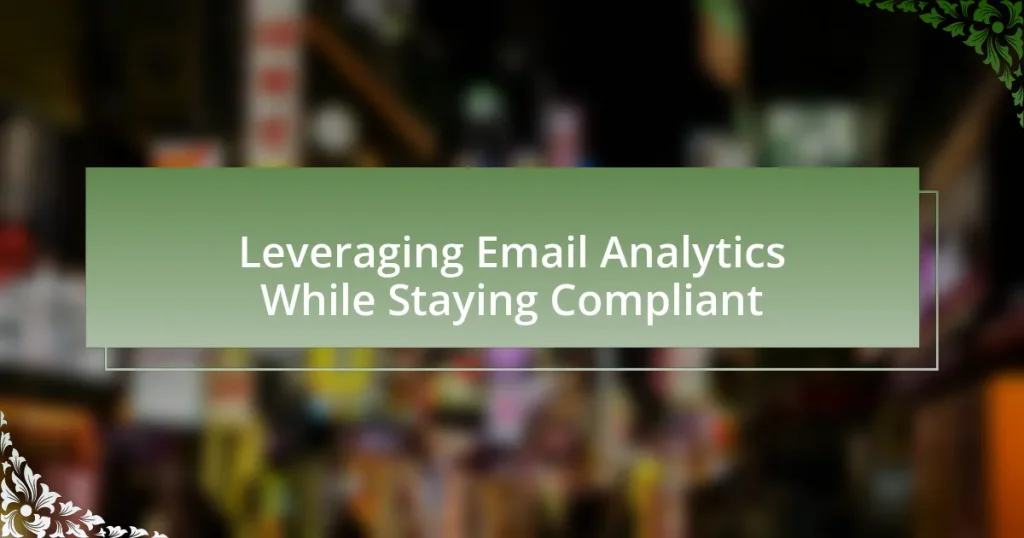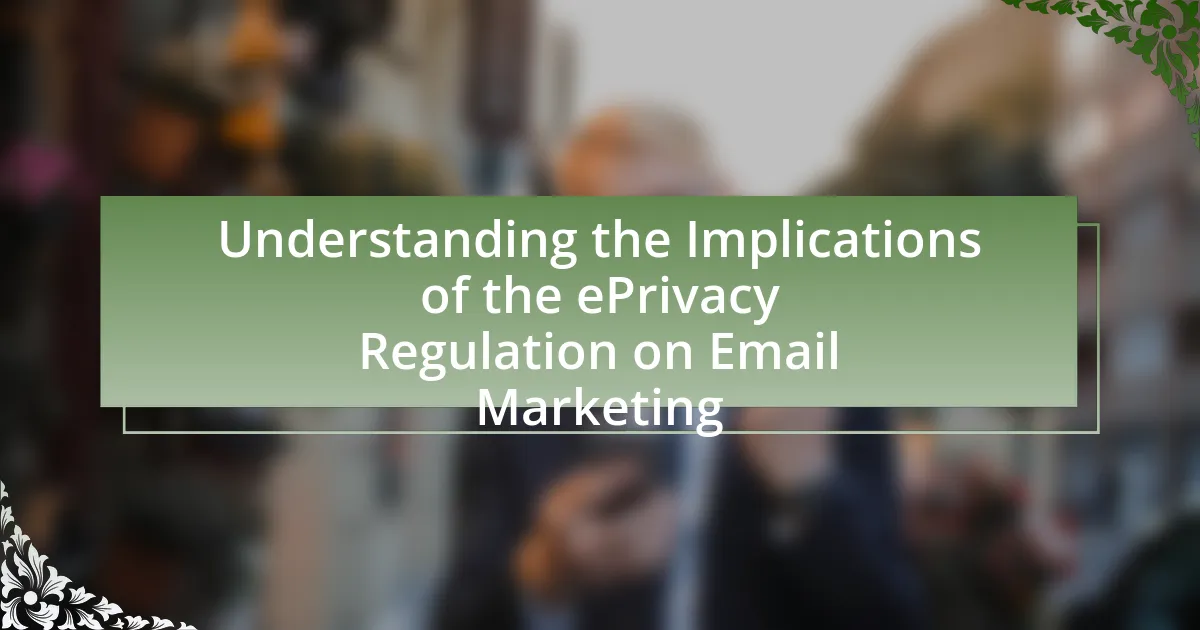Leveraging email analytics while staying compliant is essential for organizations aiming to enhance their marketing strategies while adhering to legal regulations such as the General Data Protection Regulation (GDPR) and the CAN-SPAM Act. The article outlines how businesses can utilize key metrics like open rates, click-through rates, and conversion rates to optimize email campaigns, while emphasizing the importance of obtaining explicit consent and ensuring data privacy. It also discusses the challenges of compliance, the risks of non-compliance, and best practices for balancing analytics with regulatory requirements. Additionally, the article highlights the role of technology and emerging regulations in shaping the future of email analytics and compliance.

What is Leveraging Email Analytics While Staying Compliant?
Leveraging email analytics while staying compliant involves utilizing data from email campaigns to enhance performance while adhering to legal regulations such as the General Data Protection Regulation (GDPR) and the CAN-SPAM Act. Organizations can analyze metrics like open rates, click-through rates, and conversion rates to optimize their email strategies, but they must ensure that they collect and process personal data in a lawful manner, obtaining consent from recipients and providing clear opt-out options. Compliance with these regulations not only protects consumer privacy but also enhances brand reputation, as companies that respect user data are more likely to build trust with their audience.
How does leveraging email analytics enhance marketing strategies?
Leveraging email analytics enhances marketing strategies by providing actionable insights into customer behavior and campaign performance. These analytics allow marketers to track metrics such as open rates, click-through rates, and conversion rates, enabling them to identify what content resonates with their audience. For instance, a study by Campaign Monitor found that personalized email campaigns can lead to a 26% increase in revenue, demonstrating the effectiveness of data-driven decision-making. By analyzing this data, marketers can optimize their email content, segment their audience more effectively, and ultimately improve engagement and ROI.
What key metrics are analyzed in email analytics?
Key metrics analyzed in email analytics include open rates, click-through rates, bounce rates, unsubscribe rates, and conversion rates. Open rates measure the percentage of recipients who open an email, indicating engagement levels. Click-through rates assess how many recipients clicked on links within the email, reflecting the effectiveness of the content. Bounce rates track the percentage of emails that could not be delivered, which can signal issues with the email list quality. Unsubscribe rates show how many recipients opted out, providing insights into content relevance and audience satisfaction. Conversion rates measure the percentage of recipients who completed a desired action, such as making a purchase, demonstrating the overall success of the email campaign. These metrics are essential for evaluating performance and optimizing future email strategies.
How do these metrics inform decision-making processes?
Metrics inform decision-making processes by providing quantifiable data that highlights performance trends and user engagement levels. For instance, open rates and click-through rates reveal how effectively email campaigns capture audience interest, enabling marketers to adjust content and targeting strategies accordingly. Additionally, metrics such as bounce rates and unsubscribe rates indicate potential issues with email list quality or content relevance, prompting necessary changes to improve overall campaign effectiveness. By analyzing these metrics, organizations can make data-driven decisions that enhance customer engagement and optimize marketing efforts, ultimately leading to better compliance with regulations and improved ROI.
Why is compliance important in email analytics?
Compliance is important in email analytics because it ensures adherence to legal regulations and protects consumer privacy. Organizations must follow laws such as the General Data Protection Regulation (GDPR) and the CAN-SPAM Act, which mandate transparency in data collection and usage. Non-compliance can result in significant fines; for instance, GDPR violations can lead to penalties of up to 4% of annual global revenue. By maintaining compliance, businesses not only avoid legal repercussions but also build trust with their customers, enhancing brand reputation and fostering long-term relationships.
What regulations govern email marketing and analytics?
The primary regulations governing email marketing and analytics are the CAN-SPAM Act in the United States and the General Data Protection Regulation (GDPR) in the European Union. The CAN-SPAM Act mandates that commercial emails must include a clear opt-out mechanism, accurate sender information, and a physical address, while the GDPR requires explicit consent from individuals before their data can be processed, along with the right to access and delete their personal information. These regulations ensure that email marketing practices respect consumer privacy and data protection rights, thereby promoting ethical marketing strategies.
How can businesses ensure they are compliant while using email analytics?
Businesses can ensure compliance while using email analytics by adhering to data protection regulations such as the General Data Protection Regulation (GDPR) and the California Consumer Privacy Act (CCPA). Compliance requires obtaining explicit consent from users before collecting their data, ensuring transparency about data usage, and providing users with the option to opt-out of data collection.
For instance, GDPR mandates that businesses inform users about how their data will be used and stored, and they must implement measures to protect personal data from breaches. Additionally, businesses should regularly audit their email analytics practices to ensure they align with legal requirements and industry standards, thereby minimizing the risk of non-compliance and potential penalties.
What challenges do businesses face when leveraging email analytics?
Businesses face several challenges when leveraging email analytics, primarily related to data privacy and compliance with regulations such as GDPR and CCPA. These regulations impose strict guidelines on how personal data can be collected, stored, and analyzed, which can limit the scope of email analytics. For instance, businesses must obtain explicit consent from users before tracking their email interactions, complicating data collection efforts. Additionally, ensuring data security to protect sensitive information from breaches is a significant concern, as violations can lead to hefty fines and reputational damage. Furthermore, interpreting the analytics data accurately can be challenging due to the complexity of metrics and the need for skilled personnel to analyze and derive actionable insights.
How can data privacy concerns impact email analytics?
Data privacy concerns can significantly impact email analytics by limiting the data that can be collected and analyzed. Regulations such as the General Data Protection Regulation (GDPR) and the California Consumer Privacy Act (CCPA) impose strict guidelines on how personal data can be used, which can restrict marketers from accessing comprehensive user behavior data. For instance, under GDPR, organizations must obtain explicit consent from users before tracking their email interactions, which can lead to reduced sample sizes and less accurate analytics. Consequently, this limitation can hinder the ability to personalize marketing efforts and optimize email campaigns effectively, as marketers may lack critical insights into user preferences and engagement patterns.
What are the risks of non-compliance in email marketing?
Non-compliance in email marketing poses significant risks, including legal penalties, reputational damage, and loss of customer trust. Legal penalties can arise from violations of regulations such as the CAN-SPAM Act or GDPR, which can result in fines reaching thousands of dollars per violation. Reputational damage occurs when customers perceive a brand as untrustworthy due to unsolicited emails or data mishandling, leading to decreased engagement and potential loss of business. Furthermore, loss of customer trust can result in reduced email open rates and higher unsubscribe rates, ultimately impacting the effectiveness of marketing campaigns.
How can businesses effectively balance analytics and compliance?
Businesses can effectively balance analytics and compliance by implementing robust data governance frameworks that ensure adherence to regulations while maximizing data utility. This involves establishing clear policies for data collection, usage, and storage that align with legal requirements such as GDPR or CCPA. For instance, organizations can utilize anonymization techniques to analyze customer data without compromising individual privacy, thereby maintaining compliance. Additionally, regular audits and training for employees on compliance standards can reinforce a culture of accountability, ensuring that analytics practices do not violate regulations. This approach not only safeguards against legal repercussions but also enhances trust with customers, as evidenced by studies showing that companies prioritizing compliance see improved customer loyalty and engagement.
What tools are available for compliant email analytics?
Tools available for compliant email analytics include HubSpot, Mailchimp, and SendGrid. HubSpot offers features that ensure compliance with regulations like GDPR and CAN-SPAM, providing analytics on email performance while respecting user privacy. Mailchimp also adheres to compliance standards, offering insights into campaign effectiveness while allowing users to manage subscriber consent. SendGrid provides robust analytics tools that comply with industry regulations, enabling businesses to track email engagement without compromising user data security. These tools are designed to help organizations analyze email performance while maintaining adherence to legal requirements.
How do these tools help maintain compliance?
These tools help maintain compliance by automating the monitoring and reporting of email communications to ensure adherence to regulatory standards. They provide real-time analytics that identify potential compliance risks, such as unauthorized data sharing or policy violations, enabling organizations to take corrective actions promptly. For instance, tools can track email content and metadata, ensuring that sensitive information is handled according to regulations like GDPR or HIPAA, thereby reducing the likelihood of costly fines or legal issues.
What features should businesses look for in email analytics tools?
Businesses should look for features such as real-time tracking, detailed reporting, segmentation capabilities, and compliance with data protection regulations in email analytics tools. Real-time tracking allows businesses to monitor email performance as it happens, providing immediate insights into open rates and click-through rates. Detailed reporting offers comprehensive metrics that help assess campaign effectiveness, while segmentation capabilities enable targeted analysis of different audience groups. Compliance with data protection regulations, such as GDPR, ensures that businesses handle customer data responsibly and legally, which is crucial for maintaining trust and avoiding penalties.

What are the best practices for leveraging email analytics while staying compliant?
To leverage email analytics while staying compliant, organizations should prioritize obtaining explicit consent from recipients before collecting data. This practice aligns with regulations such as the General Data Protection Regulation (GDPR) and the CAN-SPAM Act, which mandate transparency in data collection. Additionally, organizations must ensure that they anonymize or aggregate data to protect individual identities, thereby minimizing privacy risks. Regularly reviewing and updating privacy policies to reflect current practices and compliance requirements is also essential. According to a report by the International Association of Privacy Professionals (IAPP), organizations that prioritize compliance in their analytics practices not only mitigate legal risks but also enhance customer trust and engagement.
How can businesses implement effective email analytics strategies?
Businesses can implement effective email analytics strategies by utilizing advanced tracking tools to monitor key performance indicators such as open rates, click-through rates, and conversion rates. These metrics provide insights into recipient engagement and campaign effectiveness, allowing businesses to refine their email marketing efforts. For instance, a study by Campaign Monitor found that personalized email campaigns can increase click-through rates by up to 14% and conversions by 10%. Additionally, businesses should ensure compliance with regulations like GDPR and CAN-SPAM by obtaining explicit consent from recipients and providing clear opt-out options, which not only protects consumer rights but also enhances brand trust.
What steps should be taken to ensure data protection?
To ensure data protection, organizations should implement strong encryption protocols for data at rest and in transit. Encryption safeguards sensitive information from unauthorized access, making it unreadable without the appropriate decryption key. According to a report by the Ponemon Institute, organizations that employ encryption experience 50% fewer data breaches compared to those that do not. Additionally, regular data audits and compliance checks should be conducted to identify vulnerabilities and ensure adherence to regulations such as GDPR and HIPAA. These steps collectively enhance data security and maintain user trust.
How can businesses educate their teams on compliance issues?
Businesses can educate their teams on compliance issues through structured training programs and regular updates on regulatory changes. Implementing comprehensive training sessions that cover relevant laws, company policies, and ethical standards ensures that employees understand their responsibilities. Additionally, utilizing online platforms for ongoing education allows for easy access to updated materials and resources. Regular assessments and quizzes can reinforce knowledge retention and identify areas needing improvement. According to a study by the Ethics & Compliance Initiative, organizations with effective compliance training programs see a 50% reduction in misconduct incidents, highlighting the importance of education in fostering a compliant workplace.
What role does consent play in email analytics?
Consent is crucial in email analytics as it ensures compliance with data protection regulations and respects user privacy. Without obtaining explicit consent from recipients, organizations risk violating laws such as the General Data Protection Regulation (GDPR) and the California Consumer Privacy Act (CCPA), which mandate that personal data can only be processed if the individual has given clear permission. Furthermore, consent fosters trust between businesses and consumers, leading to higher engagement rates and improved data quality, as users are more likely to interact with content they have agreed to receive.
How can businesses obtain and manage consent effectively?
Businesses can obtain and manage consent effectively by implementing clear and transparent consent mechanisms, such as opt-in forms that specify the purpose of data collection. This approach ensures that users understand what they are consenting to, which is crucial for compliance with regulations like GDPR and CCPA. For instance, a study by the International Association of Privacy Professionals found that organizations with clear consent processes experience higher user trust and engagement, leading to better data management outcomes. Additionally, businesses should regularly review and update their consent records to maintain compliance and adapt to changing regulations, ensuring that consent remains valid and relevant over time.
What are the implications of consent withdrawal on analytics?
Consent withdrawal significantly impacts analytics by necessitating the cessation of data processing for individuals who have opted out. When consent is withdrawn, organizations must immediately stop collecting, storing, or analyzing any personal data associated with that individual, which can lead to gaps in data sets and affect the overall accuracy of analytics. For instance, according to the General Data Protection Regulation (GDPR), organizations are required to respect individuals’ rights to withdraw consent at any time, which can disrupt ongoing analytics efforts and necessitate adjustments in data strategies to ensure compliance.

What future trends should businesses watch in email analytics and compliance?
Businesses should watch for the increasing integration of artificial intelligence in email analytics and compliance. AI technologies are enhancing data analysis capabilities, allowing for more precise tracking of user engagement and behavior patterns. According to a report by Gartner, by 2025, 70% of organizations will use AI to improve their email marketing strategies, which will also help in ensuring compliance with regulations like GDPR and CCPA by automating data protection measures. Additionally, the rise of privacy-centric regulations will drive businesses to adopt more robust compliance frameworks, ensuring that email analytics practices align with legal standards. This trend is supported by the growing emphasis on consumer data protection, as highlighted in the 2022 Privacy and Data Protection Report by the International Association of Privacy Professionals, which indicates that 65% of companies are prioritizing compliance in their email marketing efforts.
How is technology evolving in the realm of email analytics?
Technology is evolving in the realm of email analytics through the integration of artificial intelligence and machine learning, which enhance data processing and predictive capabilities. These advancements allow for more accurate segmentation, improved personalization, and real-time performance tracking of email campaigns. For instance, AI algorithms can analyze user behavior patterns to optimize send times and content, leading to higher engagement rates. Additionally, the use of advanced analytics tools enables marketers to comply with regulations like GDPR by providing insights into user consent and data usage, ensuring that email strategies remain both effective and compliant.
What emerging regulations should businesses be aware of?
Businesses should be aware of emerging regulations such as the General Data Protection Regulation (GDPR) in Europe, the California Consumer Privacy Act (CCPA), and the proposed American Data Privacy Protection Act (ADPPA). These regulations impose strict guidelines on data collection, storage, and usage, particularly concerning personal information. For instance, GDPR mandates that businesses obtain explicit consent from users before processing their data, while CCPA grants consumers the right to know what personal data is being collected and the ability to opt-out of its sale. The ADPPA aims to create a federal standard for data privacy, which could further impact how businesses manage email analytics and user data. Compliance with these regulations is crucial to avoid significant fines and legal repercussions.
How can businesses prepare for future compliance challenges?
Businesses can prepare for future compliance challenges by implementing robust data governance frameworks and staying informed about regulatory changes. Establishing clear policies for data management, including data collection, storage, and usage, ensures adherence to compliance standards. Regular training for employees on compliance requirements and best practices further strengthens the organization’s ability to navigate evolving regulations. Additionally, utilizing technology solutions that automate compliance monitoring can enhance efficiency and accuracy in meeting regulatory obligations. For instance, a study by Deloitte highlights that organizations with proactive compliance strategies are 50% more likely to avoid regulatory penalties.
What practical tips can enhance email analytics while ensuring compliance?
To enhance email analytics while ensuring compliance, organizations should implement data anonymization techniques to protect personal information. By anonymizing data, businesses can analyze trends and user behavior without compromising individual privacy, thus adhering to regulations like GDPR and CCPA. Additionally, utilizing consent management tools allows companies to track user permissions effectively, ensuring that analytics practices align with legal requirements. According to a report by the International Association of Privacy Professionals, organizations that prioritize compliance in their analytics processes reduce the risk of data breaches and legal penalties, reinforcing the importance of these practices.




